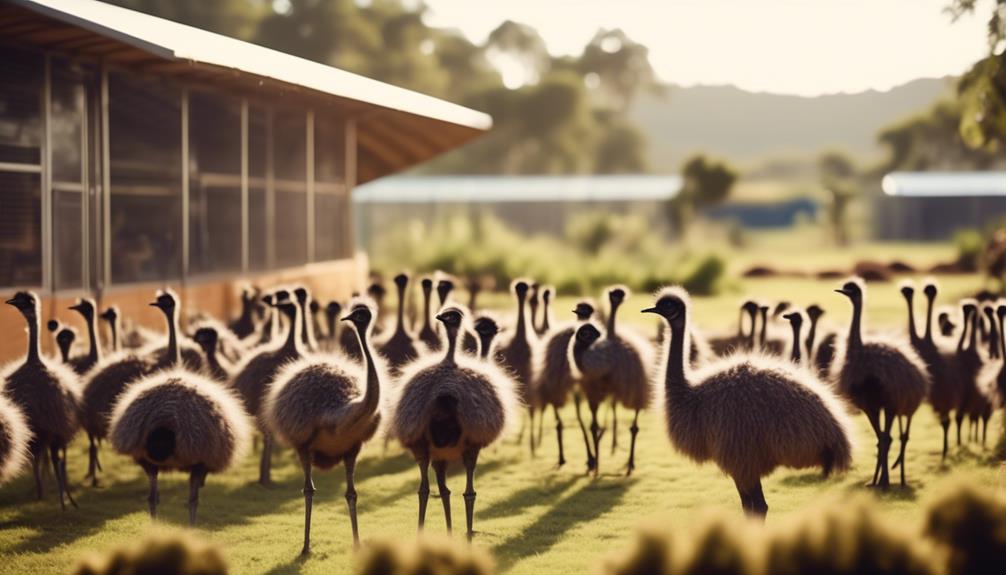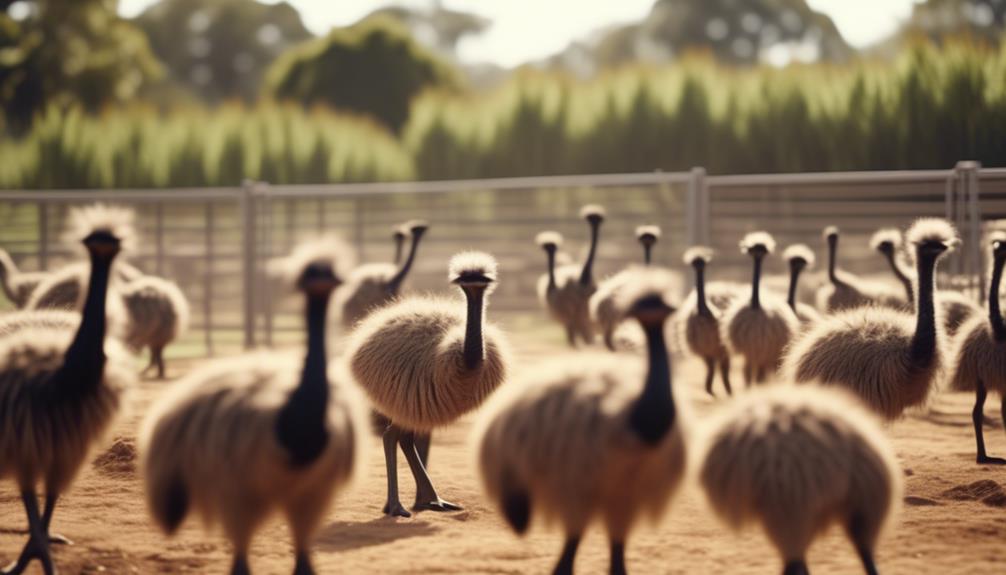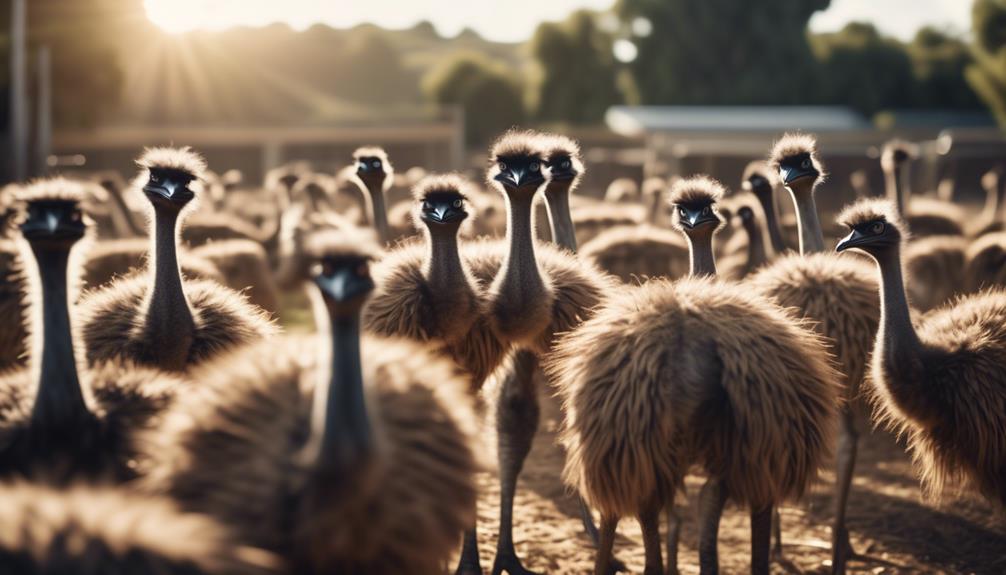
With the growing interest in sustainable and alternative farming practices, it's clear that the future of emu farming is poised for exciting developments.
Emu farming, a unique and unconventional industry, has garnered attention for its potential in meeting various demands, from food security to profitable business ventures.
And while the industry faces its fair share of challenges, recent advancements in technology and a focus on sustainable practices are paving the way for a promising future.
But what exactly does the future hold for emu farming? What trends and predictions can we anticipate? Strap in, because the answers might just surprise you.
Growing Demand for Emu Products

The demand for emu products is steadily increasing, driven by factors such as their nutritional benefits and potential applications in various industries. Emu meat, known for its lean and low-fat content, has gained popularity among health-conscious consumers. With growing concerns about obesity and heart-related diseases, more individuals are opting for healthier food choices, and emu meat fits the bill perfectly. Additionally, emu oil, derived from the fat of the bird, is rich in omega-3 fatty acids and has been touted for its anti-inflammatory and moisturizing properties. This has led to a surge in demand for emu oil in the skincare and pharmaceutical industries.
In the growing market for emu products, consumer preferences play a crucial role. People are increasingly seeking out sustainable and ethically sourced products, and emu farming aligns with these preferences. Emus are low-maintenance birds that can be raised in environmentally friendly conditions, making their products more appealing to conscious consumers. Furthermore, the versatility of emu products, such as emu oil being used in cosmetics and emu eggs being sought after for their decorative purposes, caters to a wide range of consumer needs and preferences.
As the market continues to expand, it's predicted that the demand for emu products will only increase. With consumers becoming more health-conscious and environmentally aware, the future of emu farming looks promising. Emu farmers should capitalize on these trends and adapt their practices to meet the evolving demands of the market.
Advancements in Emu Farming Technology
Advancements in emu farming technology have revolutionized the industry, enabling farmers to optimize production efficiency and meet the growing demand for emu products. Improved emu nutrition plays a crucial role in enhancing the overall health and productivity of these birds. Through extensive research and development, scientists have formulated specialized feed that contains all the essential nutrients required for emus to thrive. This has resulted in improved growth rates, higher egg production, and healthier offspring. By providing the right balance of proteins, vitamins, and minerals, farmers can ensure that their emus reach their full genetic potential.
Automation in emu farming has also played a significant role in streamlining operations and increasing productivity. With the introduction of automated feeding and watering systems, farmers can now efficiently manage large flocks of emus with minimal labor. These systems are designed to deliver the precise amount of feed and water, reducing wastage and ensuring that emus receive optimal nutrition. Additionally, automated egg collection and incubation systems have simplified the process of breeding and hatching emu chicks, saving time and improving hatch rates.
As technology continues to advance, we can expect even more innovations in emu farming. Predictive analytics and data-driven decision-making will enable farmers to optimize their production processes, identify potential health issues, and ensure the well-being of their emus. With advancements in genetic engineering, we may also see the development of emu breeds that are specifically bred for certain desirable traits, such as improved meat quality or feather production.
Increased Focus on Sustainable Emu Farming Practices

Sustainable emu farming practices are gaining increasing attention as the industry seeks to minimize its environmental impact and ensure long-term viability. Emu farmers are recognizing the importance of adopting sustainable farming practices to not only protect the environment but also to meet the changing demands of consumers who prioritize ethical and environmentally-friendly products.
Here are three key trends that are shaping sustainable emu farming practices:
- Regenerative Grazing: Emu farmers are implementing regenerative grazing techniques that focus on improving soil health and biodiversity. By rotating emus across different pastures, farmers allow the land to rest and regenerate, reducing soil erosion and promoting the growth of native vegetation.
- Water Conservation: Emu farming operations are increasingly investing in water-saving technologies and practices to reduce their water consumption. This includes the installation of efficient irrigation systems, capturing and recycling rainwater, and implementing water management plans to minimize wastage.
- Waste Management: Emu farmers are adopting innovative waste management strategies to minimize the environmental impact of their operations. This includes composting emu manure to create organic fertilizers, utilizing anaerobic digestion systems to generate biogas from waste, and implementing proper disposal methods for packaging materials.
Rise of Emu Farming as a Profitable Business Venture
Emu farming has emerged as a lucrative and promising business opportunity, driven by increasing demand for emu-related products and the potential for high returns on investment. The profitability of emu meat sales is a key factor contributing to the rise of emu farming as a profitable business venture. Emu meat is lean, low in cholesterol, and rich in iron, making it a healthy and sought-after alternative to traditional meats.
The market for emu meat is expected to grow steadily in the coming years, as consumers become more health-conscious and seek out sustainable and ethically-raised protein sources. To capitalize on the rising demand for emu products, effective marketing strategies are essential. Emu farmers can target niche markets such as health-conscious individuals, athletes, and those following specific diets like paleo or keto.
Emphasizing the unique qualities of emu meat, such as its nutritional benefits and sustainable farming practices, can create a strong value proposition for potential customers. In addition to meat, other emu-related products such as oil, feathers, and leather can contribute to the profitability of emu farming. Emu oil is known for its anti-inflammatory properties and is used in various beauty and wellness products.
Emu feathers are highly valued in the fashion and arts industry, while emu leather is considered a premium material for luxury goods. As the demand for emu-related products continues to rise, investing in emu farming can be a lucrative business venture. With effective marketing strategies and a focus on quality, sustainable production, emu farmers have the potential to achieve high profitability and success in the industry.
Emu Farming as a Solution for Food Security

To address the issue of food security, the integration of emu farming into agricultural systems holds significant potential. Emus are highly adaptable birds that can survive in diverse climates and require less water and feed compared to traditional livestock. Here are three key reasons why emu farming can contribute to food security:
- Emu farming and climate change: Emus have a unique ability to withstand extreme weather conditions, making them resilient to the impacts of climate change. As global temperatures rise and weather patterns become more unpredictable, emu farming offers a sustainable solution for food production. Emus can thrive in arid and semi-arid regions where traditional agricultural practices may struggle.
- Emu farming and rural employment opportunities: Emu farming not only addresses food security but also contributes to rural economic development. Establishing emu farms can create employment opportunities for local communities, particularly in rural areas where job prospects may be limited. This can help alleviate poverty and enhance socio-economic stability in these regions.
- Emu farming and sustainable agriculture: Emus are low-maintenance animals that require minimal resources and inputs. Their efficient conversion of feed into meat and oil makes emu farming a sustainable agricultural practice. By incorporating emu farming into existing agricultural systems, farmers can diversify their income streams and reduce their reliance on conventional livestock, thus promoting sustainable farming practices.
Health Benefits of Emu Products Driving Consumer Interest
As the demand for sustainable and nutritious food options continues to grow, you're becoming increasingly interested in the health benefits offered by emu products.
Emu products have long played a role in traditional medicine, with indigenous cultures utilizing various parts of the emu for their healing properties. For example, emu oil, derived from the bird's fat, is rich in omega-3 and omega-6 fatty acids, which are known to have anti-inflammatory properties. This makes emu oil a popular choice for treating skin conditions such as eczema and psoriasis.
Not only do emu products offer potential health benefits, but they also have a positive impact on local economies. Emu farming provides opportunities for employment and economic growth in rural areas. The demand for emu products, both domestically and internationally, creates a sustainable market for farmers, encouraging them to invest in their businesses and contribute to the local economy.
Looking ahead, the health benefits of emu products are expected to continue driving consumer interest. As more research is conducted and awareness grows, the potential uses of emu products in various industries, such as cosmetics and pharmaceuticals, will likely expand.
Emu farming will also play a crucial role in meeting the increasing demand for sustainable and nutritious food options. By supporting the emu farming industry, you not only benefit from the health advantages of emu products but also contribute to the growth of local economies.
Emu Farming as an Alternative Livestock Option

With the increasing demand for sustainable and nutritious food options, the viability of emu farming as an alternative livestock option is gaining attention. Emus, large flightless birds native to Australia, have several characteristics that make them an attractive choice for sustainable farming practices.
Here are three key reasons why emu farming is emerging as a promising alternative livestock option:
- Low environmental impact: Emus have a significantly lower environmental footprint compared to traditional livestock such as cattle or pigs. They require less land, water, and feed, making them a more sustainable choice for farmers looking to minimize their ecological impact.
- High feed conversion efficiency: Emus are highly efficient at converting feed into meat and other products. They've a unique digestive system that allows them to extract maximum nutrients from their diet, resulting in a higher yield of usable meat per unit of feed consumed.
- Diverse product range: Emus offer a wide range of products beyond just meat, including oil, leather, feathers, and eggs. This versatility allows farmers to diversify their revenue streams and tap into multiple markets, increasing the profitability of their operations.
As consumers become increasingly conscious of the environmental and ethical implications of their food choices, alternative livestock options like emu farming are likely to gain further traction. Emus not only offer a sustainable and nutritious food source but also provide additional economic opportunities for farmers. As the demand for alternative livestock continues to grow, the future of emu farming looks bright.
Emu Farming and the Role of Genetics in Breeding Programs
Genetics plays a crucial role in emu farming breeding programs, shaping the future of the industry through data-driven selection and prediction techniques. The success of emu breeding programs relies heavily on maintaining genetic diversity within the population. Genetic diversity ensures that the emus have a wide range of traits, which can be beneficial in terms of adaptability, disease resistance, and overall productivity.
To maintain genetic diversity, emu breeders carefully select breeding pairs based on their genetic profiles. By analyzing the genetic makeup of individual emus, breeders can identify desirable traits and potential risks for diseases. This data-driven approach allows them to make informed decisions that maximize the overall health and productivity of the emu population.
In addition to genetic diversity, emu breeding programs also focus on disease resistance. Emus, like any other livestock, are susceptible to various diseases that can have a significant impact on their well-being and productivity. By selectively breeding emus with natural resistance to certain diseases, breeders can reduce the risk of outbreaks and minimize the need for medical interventions.
The integration of genetics into emu breeding programs is a promising trend that will continue to shape the future of the industry. Through data-driven selection and prediction techniques, breeders can ensure the long-term success and sustainability of emu farming by maintaining genetic diversity and enhancing disease resistance. This approach not only benefits the emus but also contributes to the overall profitability and efficiency of the industry.
Emu Farming and the Potential for International Expansion

Emu farming's success in maintaining genetic diversity and enhancing disease resistance sets the stage for its potential international expansion as a data-driven, analytically-backed industry. With the international market potential on the rise, emu farming is poised to make its mark on a global scale. Here are three key factors that contribute to the potential for international expansion:
- Growing demand for emu products: Emu oil, meat, and feathers have gained popularity worldwide due to their various health benefits and applications. As more consumers become aware of the nutritional value and medicinal properties of emu products, the demand continues to grow, creating a lucrative market for emu farmers.
- Cultural significance of emu farming: Emus hold cultural importance in many countries, particularly in Australia, where they're considered a symbol of resilience and strength. Emu farming allows for the preservation of this cultural heritage while also providing economic opportunities for local communities. As the cultural significance of emu farming extends beyond borders, there's a potential for international collaboration and appreciation.
- Advancements in technology: Emu farming has embraced technological advancements, such as genetic testing and data analytics, to improve breeding programs and enhance productivity. These innovations have made emu farming more efficient, reliable, and profitable. As other countries seek to establish or optimize their own emu farming industries, they can leverage these technological advancements to accelerate their progress.
As emu farming continues to thrive and evolve, its potential for international expansion becomes increasingly evident. By capitalizing on the growing demand, cultural significance, and technological advancements, emu farmers can tap into new markets and bring the benefits of this industry to a global audience.
Challenges and Opportunities in Emu Farming
The challenges and opportunities that lie ahead in the emu farming industry can be analyzed and predicted through a data-driven and analytical approach, allowing you, as a farmer, to make informed decisions for future success.
In terms of challenges, one key area is emu breeding. Emus have a longer reproductive cycle compared to other livestock, with females laying eggs only once a year. This poses a challenge in terms of managing breeding programs and maintaining a steady supply of emus for production. However, advancements in assisted reproduction techniques, such as artificial insemination and embryo transfer, offer opportunities to overcome these challenges and enhance breeding efficiency.
On the other hand, there are exciting opportunities in emu byproduct development. Emus produce various valuable byproducts, including meat, oil, feathers, and leather. The demand for these byproducts is steadily increasing, driven by the growing interest in natural and sustainable products.
Emu meat, for example, is low in fat and cholesterol, making it a healthy alternative to traditional meat. Emu oil is known for its anti-inflammatory and moisturizing properties, making it a sought-after ingredient in cosmetic and pharmaceutical products. By capitalizing on these opportunities, you can diversify your income streams and maximize the value of your emu farming operations.
Government Support and Regulation for Emu Farming Industry

Government policies and regulations play a crucial role in shaping the future of the emu farming industry, providing a framework for sustainable growth and ensuring the well-being of both farmers and the environment. As the emu farming industry continues to evolve, governments around the world are recognizing the importance of supporting this sector through various incentives and standards.
Here are three key aspects of government support and regulation for the emu farming industry:
- Government Incentives: Governments are implementing various incentives to encourage emu farming. These incentives can include tax breaks, grants, and subsidies for emu farmers. By providing financial support, governments aim to boost the growth of the industry and attract more individuals to invest in emu farming.
- Industry Standards: Governments play a crucial role in setting and enforcing industry standards for emu farming. These standards cover various aspects, such as animal welfare, food safety, and environmental sustainability. By setting clear guidelines and regulations, governments ensure that emu farmers adhere to the highest standards, promoting responsible farming practices and consumer trust.
- Research and Development Support: Governments also contribute to the future of emu farming by investing in research and development initiatives. By funding research projects and collaborating with industry experts, governments help drive innovation, improve breeding techniques, and develop new products derived from emu oil and other by-products. This support fosters continuous improvement within the industry and opens doors for new opportunities.
Frequently Asked Questions
What Are the Most Common Challenges Faced in Emu Farming?
You'll face common challenges in emu farming, such as mastering emu breeding techniques and ensuring proper emu feed and nutrition. These factors are crucial for success in the industry.
How Can Emu Farming Contribute to Food Security?
Emu farming can contribute to food security by promoting sustainability and economic growth. With its high protein content and low resource requirements, emu meat can meet the increasing demand for nutritious and environmentally friendly food.
What Are the Health Benefits Associated With Emu Products?
Looking to improve your health? Ever wondered about the benefits of emu products? From the nutrient-rich emu meat to the healing properties of emu oil, these products offer a promising future for your well-being.
What Government Regulations Are in Place to Support the Emu Farming Industry?
Government regulations play a crucial role in supporting the emu farming industry. Financial incentives are provided to encourage growth and sustainability. These measures ensure that the industry thrives, creating a favorable environment for emu farmers to succeed.
What Are the Potential Opportunities for International Expansion in Emu Farming?
You have the potential to expand internationally in emu farming through strategic international partnerships. The market demand for emu products is growing, creating opportunities to tap into new markets and increase your profitability.
Conclusion
In conclusion, the future of emu farming appears promising, with growing demand and advancements in technology driving the industry forward.
Sustainable practices and genetic breeding programs will play a pivotal role in ensuring success.
Emu farming has the potential to become a profitable business venture, addressing food security concerns.
Furthermore, with government support and regulation, international expansion is on the horizon.
Embrace this emu-eccentric enterprise, as the future holds vast opportunities for this thriving industry.


